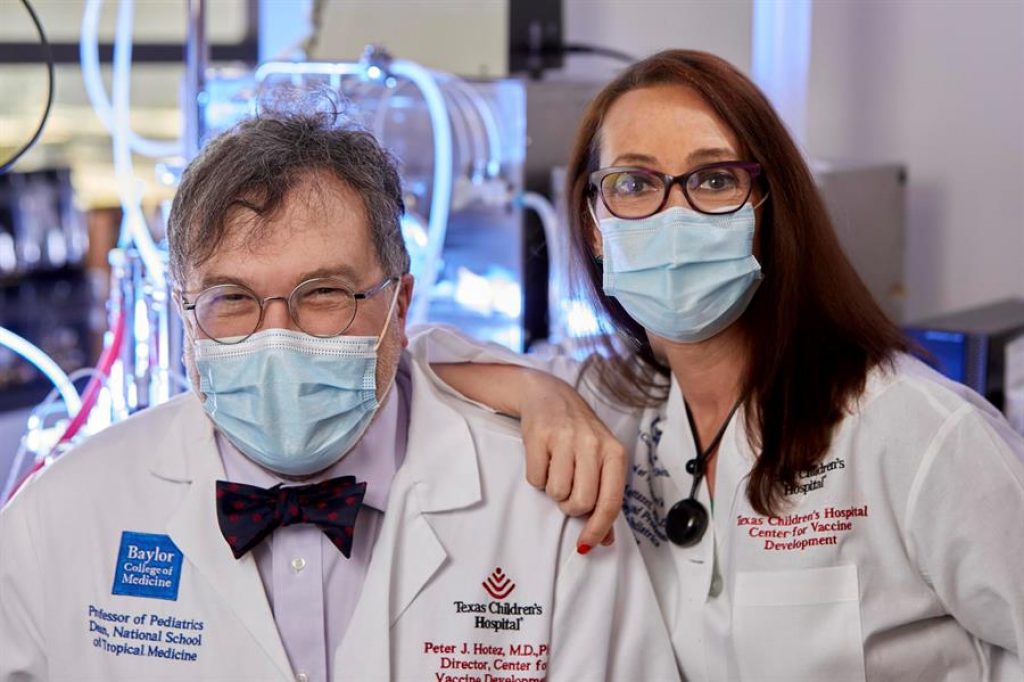The Corbevax vaccine that the Texas Children’s Hospital and the Baylor College of Medicine have launched patent-free and at low cost, is a relief for poor countries affected by the covid-19 pandemic, according to Honduran microbiologist María Elena Bottazzi.
“10 years ago we received funds to start a program for emerging diseases, focusing on two coronaviruses, first SARS and then MERS, and that knowledge has allowed us to later develop prototypes for the covid vaccine from 2020 -19 , “Bottazzi said by phone from Houston, Texas.
INDIA AUTHORIZES ITS EMERGENCY USE
Bottazzi, co-director of the Texas Children’s Hospital and the Baylor School of Medicine, non-profit institutions, explained that the model of vaccines that they promote “does not patent because in that way its technology can be transferred not exclusively to just one group, but to many manufacturing organizations so they can not only learn but also produce and scale. “
In addition, “we do everything with publications that are open so that the scientific community can also see how we did our engineering, how it can be produced and that is what makes it a bit more generic. No secret of the process is kept and that can be replicated in various places around the world, “he stressed.
Closing 2021, both institutions announced that Corbevax, a covid-19 protein subunit, whose technology was created and designed at their Center for Vaccine Development, had received approval for emergency use in India, to be launched in that country and others neglected to follow.
“We are calling it the world’s vaccine,” Bottazzi said, referring to Corbevax and its low cost, one to two dollars, compared to the high cost of other well-known pharmaceutical companies.
He added that the first alliance they have made for Corbevax to be produced on a large scale is with the company Biological E, from India, with the capacity to put 100 million doses a month on the market, although between January and February they expect to have 300 million, and they could soon qualify to export.
“At the same time we are working with other manufacturing organizations in Indonesia, Bangladesh – which could also produce 100 million doses per month each country – and others that want to establish capacity in Africa,” emphasized Bottazzi, a graduate in Microbiology and Clinical Chemistry from the National Autonomous University of Honduras (UNAH).
PROJECT FOR CENTRAL AMERICA
Bottazzi advocates that his Corbevax vaccine project, which he co-directs with Peter Hotez and a team of scientists, reaches the largest number of poor countries, mainly Latin America, the region of the world with the highest incidence of covid-19.
The scientist, of Honduran, Italian and American nationalities, also promotes other projects to create a research and development capacity in Central America and the Caribbean and hopes to achieve something concrete soon from Panama.
The project in Central America and the Caribbean, according to Bottazzi, may be possible with financing from the Central American Bank for Economic Integration (CABEI) and the Inter-American Development Bank (IDB), among other organizations.
With regard to Honduras, he advocates for there to be greater awareness to encourage research and development in the UNAH, in addition to encouraging new generations and that the Government that will take office on the 27th, with Xiomara Castro as president, “recognize that you have to invest in science and public health. “
Since the covid-19 pandemic began to spread in Honduras, in March 2020, the country with 9.5 million inhabitants has registered at least 10,444 deaths and 381,254 infections, according to the state National Risk Management System (Singer ).
PHARMACEUTICALS SHOULD BE MORE ALTRUISTIC
Bottazzi, who began to enter the field of research in Honduras, also pointed out that in the United States he has been working on the development of vaccines for more than 20 years, and that he began “with a very specific focus” on developing drugs. for neglected tropical diseases, many known in Honduras that have to do with intestinal worms, Chagas disease, and leishmaniasis.
“Many of these vaccines are advancing slowly because its development is slow, but it is even more so for such diseases (covid-19) because they would be for people obviously poor and would have to be very inexpensive and accessible”, emphasized.
The professional indicated that the multinationals of the pharmaceutical industry have certain objectives and incentives, and received a huge amount of subsidies, both from governments and from countries in particular for the production of vaccines against covid-19, so she considers that “they would have to be a little more altruistic, offering a little benefit to the world, especially when we are still in an emergency situation.
